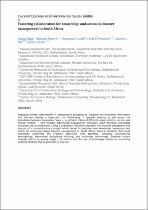 ResearchSpace
ResearchSpace
Fostering collaboration for knowledge and action in disaster management in South Africa
JavaScript is disabled for your browser. Some features of this site may not work without it.
- ResearchSpace
- →
- Research Publications/Outputs
- →
- Journal Articles
- →
- View Item
| dc.contributor.author |
Sitas, Nadia E

|
|
| dc.contributor.author |
Reyers, B

|
|
| dc.contributor.author |
Cundill, G

|
|
| dc.contributor.author |
Prozesky, HE

|
|
| dc.contributor.author |
Nel, JL

|
|
| dc.contributor.author |
Esler, KJ

|
|
| dc.date.accessioned | 2016-10-13T12:53:40Z | |
| dc.date.available | 2016-10-13T12:53:40Z | |
| dc.date.issued | 2016-04 | |
| dc.identifier.citation | Sitas, N.E, Reyers, B., Cundill, G., Prozesky, H.E., Nel J.L. and Esler, K.J. 2016. Fostering collaboration for knowledge and action in disaster management in South Africa. Current Opinions in Environmental Sustainability, 19, 94-102 | en_US |
| dc.identifier.issn | 1877-3435 | |
| dc.identifier.uri | http://www.sciencedirect.com/science/article/pii/S1877343515300191 | |
| dc.identifier.uri | http://hdl.handle.net/10204/8804 | |
| dc.description | Copyright: 2016 Elsevier. Due to copyright restrictions, the attached PDF file only contains the abstract of the full text item. For access to the full text item, please consult the publisher's website. The definitive version of the work is published Current Opinions in Environmental Sustainability, 19, 94-102 | en_US |
| dc.description.abstract | Engaging diverse stakeholders in collaborative processes to integrate environmental information into decision making is important, but challenging. It requires working at and across the boundaries between knowledge types — a complex milieu of different value systems, norms, and mental models — and multiple stakeholder-engagement processes which facilitate knowledge exchange and co-production. Using a qualitative, inductive approach, we analysed perceptions and outputs of a transdisciplinary project which aimed to generate new knowledge, awareness and action for ecosystem-based disaster management in South Africa. Several obstacles that could potentially undermine the project's objectives were identified, including: preconceived assumptions; entrenched disciplinary thinking; and confusing terminology. Enabling factors included efforts to ensure project co-creation and the use of knowledge brokers in promoting systems thinking that is grounded in practice. | en_US |
| dc.language.iso | en | en_US |
| dc.publisher | Elsevier | en_US |
| dc.relation.ispartofseries | Workflow;16561 | |
| dc.subject | Disaster management | en_US |
| dc.subject | Ecosystem service | en_US |
| dc.subject | Knowledge exchange | en_US |
| dc.title | Fostering collaboration for knowledge and action in disaster management in South Africa | en_US |
| dc.type | Article | en_US |
| dc.identifier.apacitation | Sitas, N. E., Reyers, B., Cundill, G., Prozesky, H., Nel, J., & Esler, K. (2016). Fostering collaboration for knowledge and action in disaster management in South Africa. http://hdl.handle.net/10204/8804 | en_ZA |
| dc.identifier.chicagocitation | Sitas, Nadia E, B Reyers, G Cundill, HE Prozesky, JL Nel, and KJ Esler "Fostering collaboration for knowledge and action in disaster management in South Africa." (2016) http://hdl.handle.net/10204/8804 | en_ZA |
| dc.identifier.vancouvercitation | Sitas NE, Reyers B, Cundill G, Prozesky H, Nel J, Esler K. Fostering collaboration for knowledge and action in disaster management in South Africa. 2016; http://hdl.handle.net/10204/8804. | en_ZA |
| dc.identifier.ris | TY - Article AU - Sitas, Nadia E AU - Reyers, B AU - Cundill, G AU - Prozesky, HE AU - Nel, JL AU - Esler, KJ AB - Engaging diverse stakeholders in collaborative processes to integrate environmental information into decision making is important, but challenging. It requires working at and across the boundaries between knowledge types — a complex milieu of different value systems, norms, and mental models — and multiple stakeholder-engagement processes which facilitate knowledge exchange and co-production. Using a qualitative, inductive approach, we analysed perceptions and outputs of a transdisciplinary project which aimed to generate new knowledge, awareness and action for ecosystem-based disaster management in South Africa. Several obstacles that could potentially undermine the project's objectives were identified, including: preconceived assumptions; entrenched disciplinary thinking; and confusing terminology. Enabling factors included efforts to ensure project co-creation and the use of knowledge brokers in promoting systems thinking that is grounded in practice. DA - 2016-04 DB - ResearchSpace DP - CSIR KW - Disaster management KW - Ecosystem service KW - Knowledge exchange LK - https://researchspace.csir.co.za PY - 2016 SM - 1877-3435 T1 - Fostering collaboration for knowledge and action in disaster management in South Africa TI - Fostering collaboration for knowledge and action in disaster management in South Africa UR - http://hdl.handle.net/10204/8804 ER - | en_ZA |





